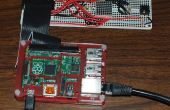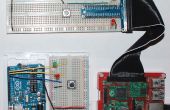Stap 2: Het programma

Kopieer dit programma naar uw RaspberryPi.
Compileer het met het commando: gcc -o klok clock.c
En voer het uit met het commando:. / klok
/********************************************************* * Filename: clock.c * * A natural language clock program for the RaspberryPi. * * Compile with the command: * gcc -o clock clock.c * * Execute with the command: ./clock * **********************************************************/ #include <time.h> #include <stdio.h> #define clrscr() printf("\e[1;1H\e[2J") char hours[24][7] = {"Twelve", "One", "Two", "Three", "Four", "Five", "Six", "Seven", "Eight", "Nine", "Ten", "Eleven", "Twelve", "One", "Two", "Three", "Four", "Five", "Six", "Seven", "Eight", "Nine", "Ten", "Eleven"}; char minutes[60][13] = {"zero", "One", "Two", "Three", "Four", "Five", "Six", "Seven", "Eight", "Nine", "Ten", "Eleven", "Twelve", "Thirteen", "Fourteen", "Fifteen", "Sixteen", "Seventeen", "Eighteen", "Nineteen", "Twenty", "Twenty-one", "Twenty-two", "Twenty-three", "Twenty-four", "Twenty-five", "Twenty-six", "Twenty-seven", "Twenty-eight", "Twenty-nine", "Thirty", "Thirty-one", "Thirty-two", "Thirty-three", "Thirty-four", "Thirty-five", "Thirty-six", "Thirty-seven", "Thirty-eight", "Thirty-nine", "Forty", "Forty-one", "Forty-two", "Forty-three", "Forty-four", "Forty-five", "Forty-six", "Forty-seven", "Forty-eight", "Forty-nine", "Fifty", "Fifty-one", "Fifty-two", "Fifty-three", "Fifty-four", "Fifty-five", "Fifty-six", "Fifty-seven", "Fifty-eight", "Fifty-nine",}; char dow[7][10] = {"Sunday","Monday","Tuesday","Wednesday", "Thursday","Friday","Saturday"}; char months[12][10] = {"January","February","March","April", "May","June","July","August","September", "October","November","December"}; char days[32][14] = {"zero", "First", "Second", "Third", "Forth", "Fifth", "Sixth", "Seventh", "Eighth", "Ninth", "Tenth", "Eleventh", "Twelfth", "Thirteenth", "Fourteenth", "Fifteenth", "Sixteenth", "Seventeenth", "Eighteenth", "Nineteenth", "Twentieth", "Twenty-first", "Twenty-second", "Twenty-third", "Twenty-forth", "Twenty-fifth", "Twenty-sixth", "Twenty-seventh", "Twenty-eighth", "Twenty-ninth", "Thirtieth", "Thirty-first"}; struct tm tm2; int timeh, timem, times; // Current hours and minutes and seconds. int date, month, year, wday; /********************************************************* * gettime() function - Loads the current time into the * global variables. It puts the hours in the variable * timeh and the minutes in timem, and so on. *********************************************************/ void gettime() { time_t now; char *str; now = time(NULL); // Get the time. str = ctime(&now); // Convert it to a string. strptime(str,"%a %b %d %H:%M:%S %Y",&tm2); // Convert from the string version. timeh = tm2.tm_hour; // Copy hours, minutes and seconds timem = tm2.tm_min; // into global variables. times = tm2.tm_sec; date = tm2.tm_mday; month = tm2.tm_mon; year = tm2.tm_year; wday = tm2.tm_wday; } /********************************************************* * dspsec() function - Displays the seconds in the * variable times. Seconds uses the same array as minutes. *********************************************************/ void dspsec(T2) { if(times>0) printf("and %s seconds ", *minutes+(T2*13)); } /********************************************************* * dsptime() function - Clears the screen and displays the * time in natural language. It uses the hours in the * variable timeh and the minutes in timem. *********************************************************/ void dsptime() { int timem2, timeh2, times2; printf("\n\n\n\n\n\n\n\n\n The time is now:\n"); switch(timem) { case 0: printf( "%s O'clock\n",*hours+(timeh*7)); dspsec(times); break; case 1: case 2: case 3: case 4: case 5: case 6: case 7: case 8: case 9: case 10: case 11: case 12: case 13: case 14: case 15: case 16: case 17: case 18: case 19: case 20: case 21: case 22: case 23: case 24: case 25: case 26: case 27: case 28: case 29: case 30: case 31: case 32: case 33: case 34: case 35: case 36: case 37: case 38: case 39: case 40: case 41: case 42: case 43: case 44: case 45: if(timem==1) printf(" %s minute ",*minutes+(timem*13)); else printf(" %s minutes ",*minutes+(timem*13)); dspsec(times); printf("past %s o'clock",*hours+(timeh*7)); break; case 46: case 47: case 48: case 49: case 50: case 51: case 52: case 53: case 54: case 55: case 56: case 57: case 58: case 59: timem2 = 60-timem; timeh++; if(timem2==1) printf(" %s minute ",*minutes+(timem2*13)); else printf(" %s minutes ",*minutes+(timem2*13)); dspsec(60-times); printf("until %s o'clock",*hours+(timeh*7)); break; } if(timeh<13) printf(" AM\n"); else printf(" PM\n"); printf(" %s, %s %s %d\n\n\n\n\n\n\n", *dow+(wday*10), *months+(month*10), *days+(date*14) ,(1900+year)); } /************************************************************** * main() function **************************************************************/ main() { int ptime = 70; // previous time after gettime() while(1) { gettime(); if(ptime != times) { clrscr(); ptime = times; dsptime(); } } }













